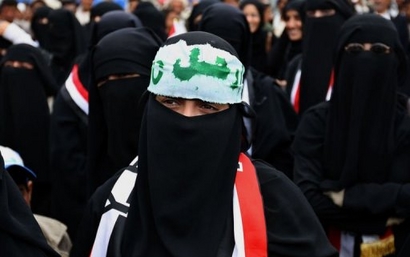
The rhetorical standoff in Yemen continues with only a limited amount of violence even while hundreds of thousands of people have been protesting, mostly against the decades-old regime of President Ali Abdullah Salih. Yesterday the New York Times commented that the protests in Yemen remain remarkably peaceful, with isolated cases of individual violence (mainly by those who support Salih) but no major clashes with the army or between tribal groups. President Salih holds a weekly rally of his supporters (some of whom have clearly been paid to come to the rally, as reporters note) as a counterpart to the far greater numbers protesting all over the country against his continued rule. He is holding on to power with a very thin string; indeed it is hardly even ‘power” any more given that much of the country is basically ignoring him and he is diplomatically isolated.
The only thing more incongruous than dictators (a military man installed in a coup after an assassination of the previous leader and who has remained in power for over three decades is at least an honorary dictator) talking about democracy is when dictators start talking about religion. Unlike Yemen’s Zaydi imams, whose millennium long rule was abolished in 1962, none of the military leaders of Yemen are noted as Quranic scholars; some could barely read and write when they came into office. Perhaps as a sign of desperation, on Friday President Salih tried his hand at the religion card. Here is how the NYT reports it:
Mr. Saleh tried a religious jab at his opposition, condemning the antigovernment protest at Sana University for allowing men and women to mix. “I call on them to prevent the mixing on University Avenue, which is not approved by Islam,†he said. But that line of attack appeared unlikely to gain much traction among average Yemenis, who do not view the president as particularly devout.
Not only does an appeal to conservative Muslims ring hollow, but it may open a Pandora’s box and encourage the very kind of radical Islamic response his regime has only loosely tolerated. Here is what one of the 5,000 female protesters in Sanaa said in response, as quoted on Al Jazeera:
“If Saleh read the Quran he wouldn’t have made this accusation,” said one protester, who gave her name only as Majda. “We ask he be tried according to Islamic law.”
I suspect President Salih would much prefer a negotiated exit by either his fellow Arab leaders or with the blessing of the U.S. and the E.U. rather than a tribunal of religious clerics. This latest rhetorical ploy is another sign of his impending exit, but the longer he lingers the greater the chances for more conservative religious proponents to eventually have a greater say in Yemen’s government. When your opposition consists of the main Islamic parties in the country, the suggestion that those within that party are behaving “un-Islamic” is not likely to gain many converts. The main religious party, Islah, is quite unlike the Salafis in Saudi Arabia and has a large following among Yemeni women.
Not being a political scientist nor a clairvoyant pundit, I do not know when Salih will finally follow in the footsteps of Ben Ali and Mubarak, but it will happen and I strongly suspect it will happen soon. The opposition is far greater and more widespread than his support. Since Salih is not able, and hopefully would not have been willing, to play the game Qaddafi is playing with the military, it is only a matter of time and that time is running out with each Friday protest. Whatever the result, it seems that in the near future President Salih will have far more time available to read the Quran, should he be so moved.